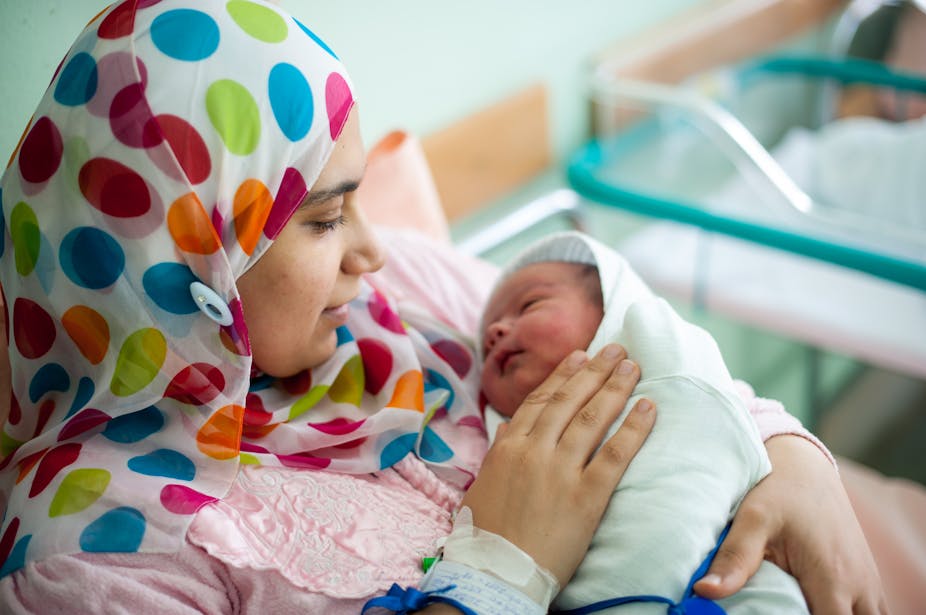Negative portrayals of Islam and Muslims are everywhere. You don’t have to look far to find stigmatising, offensive and biased news reports – all of which significantly impact how Muslims generally see the world they live in.
These experiences influence Muslim people’s day-to-day lives – and can play a role in how Muslim people conduct themselves on a daily basis. In my PhD study, I looked at the experiences of Muslim women engaging with UK maternity services. What I found was that Muslim women lacked confidence in discussing their concerns. Most specifically health concerns related to religious practices, such as fasting or wanting to see a female doctor.
The ladies I spoke to felt reluctant to ask healthcare professionals questions related to their religious needs. As one participant explained:
I could not say I am fasting which sounds extreme. Honestly, people just hear the word fasting and they think that you are so extreme.
The anticipation of healthcare professionals not having a positive opinion of them being Muslim women in general and of their religion as a whole was strongly felt among most Muslim women in the study.
This anticipation was not specifically an outcome of a negative encounter during their care, but was associated with the women’s concerns of Western media portrayal of Islam and Western attitudes towards Muslims in general.
Stigmatisation
Research has shown how the representation of Muslims in Western media became significantly more negative following the events of 9/11. Over this period the British press has often used a negative tone in presenting British Muslims, which makes them seen as an “alien other” within British society. This negative tone has only become worse with the dramatically increased coverage of radical groups such as Daesh.
Often the media makes distinctions between the actions of radical Muslims and the beliefs and actions of “mainstream” or “moderate” Muslims. Making it sound like there are “good” and “bad” Muslims.

Muslim women, in particular, are often portrayed as victims and oppressed. There is often a greater focus on their outer appearances. This is especially true for Muslim women who wear the face veil (burqa, also known as a niqab), which has long been portrayed as a symbol of oppression. The burqa has become a hot topic of debate in politics, arts and literature, even though it is estimated that 90% of Muslim women in the world do not wear the Burqa – even in most Muslim countries.
Debates and policy in Europe about banning or regulating wearing the veil contribute to the assumptions that if Muslim women wearing Islamic garments had a choice, they would not wear headscarves, burqa or any such clothing. Because of this rhetoric, it is often believed that Muslim women are oppressed and need to be saved.
‘Oppressed, young and married’
It is because of such assumptions, that the Muslim women in the study, believe healthcare professionals would also have similar beliefs – as one of the participants in the study explained:
They think that we are oppressed, young and married, and all these things they have about us that is negative.
For Muslim women this was not the image they want be identified with. They spoke of wanting to negate such representation created by Western media – but by doing so, feared they would be judged and misunderstood.
Most of the women in our study felt that they had to explain themselves every time their religion was mentioned. So rather than just asking for what they need, they felt the need to explain why they want to be seen to by a female healthcare professional or why they would like their curtains to be closed in the ward or why they cannot have medication that doesn’t meet their dietary requirements.
Avoiding the issue
Some white British women who became Muslim even felt the need to explain that being Muslim was their choice – mainly to ensure healthcare professionals didn’t make the assumption they had been forced into religion.
As for others, they felt that doctors and nurses wouldn’t understand or acknowledge their religious needs. So they would avoid discussing them freely – even though they wanted a doctor’s or midwife’s opinion on certain religious practices during pregnancy. One of the ladies we spoke to explained how she felt the need to hide why she needed to change her appointment:
I phoned up to change my appointment so it could be before the start of Ramadan. When I was asked the reason for me changing the appointment, I could not say that ‘I will be fasting for Ramadan’ so I just said that I will be travelling out of the country.
I think people do not understand actually how important our religion is to us … I feel we are forced to hide certain things to make it easier for people not to think our religion is demanding.
What all this shows is that there is a real risk of depriving Muslim women access to the care they need. Muslim women need to feel safe to express their needs in health environments. And this means healthcare professionals need to be aware of how Muslim women may feel, and their fears around speaking out.
Without this awareness, Muslim women will continue to go through the routine notions of engaging with healthcare services without getting optimal care that acknowledges their needs. And in the case of pregnant women, this could easily impact upon the health of both mother and baby.

